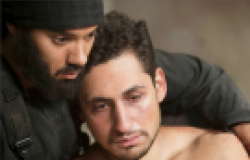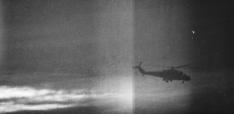An Arab Perspective on Channel 4’s "The State"

A review of Channel 4's "The State", a show that takes ISIS as its subject and Syria as its backdrop. But does it deliver on its promises?
"The State" is a four-part television serial written and directed by Peter Kosminsky, dramatising the experiences of young British Muslims going to Syria to join ISIS.
The series opens with the young recruits heading to Syria as if they are travelling to a summer camp and the complexity of this life-changing experience is neither explored nor caught. Kosminsky’s decision not to provide a context or character back stories in order not to glamorise ISIS weakens the series. Unlike his epic work, The Promise, whose characters’ mindsets is made clear to viewers, The State leaves them in the dark when it comes to the motives behind the radicalisation of such reasonable, intelligent young people. The drama could have gone further if it explored the reasons why young men and women decide to leave their comfortable life, mainly in the west, to embark on an arduous journey through many countries and join ISIS, without propagating their ideology. This is unexpected from a usually daring and courageous writer and director, who treads where others wouldn’t dare.
If you stuck your ear to the ground throughout the series you will hear them whispering their motives. They list racism, British foreign policy, establishing an Islamic Caliphate, or just thrill-seeking. Fighting the Assad regime, which many cite as the main reason behind their travel to Syria is mentioned in passing in the final episode. Many young men and women couldn’t resist the lure of an Islamic utopia: an easy, dignified life, under a 'just caliphate', and access to marriage or sex slaves, which is spun and spewed on social media by the propaganda machine of ISIS. Their odyssey begins and the consequences are tragic.
Syria is the backdrop of this series, and although it is not listed among the cast, it is one of the most memorable characters with its pulverised and pillaged cities and villages and its civilians enduring a brutal proxy war with no end in sight. Glimpses of the horrors inflicted on the Syrians on a daily basis punctuate the drama, and shows why ordinary Syrians are risking their lives to cross to Europe.
The issue of copy-cats or echoing is also dealt with, when prisoners wearing the Guantanamo orange jumpsuits are kept in cages similar to those used by the Americans on the Cuban island. ISIS hijacks the cause of Muslims detained in the American base and presents itself as their avenger and saviour, which complicates matters. For a corrupt regime like ISIS to champion the cause of Guantanamo Bay detainees taints them and hardens resolve against them.
In this advanced communications and social media age, radical groups are listening carefully to the way the western media is portraying them and are thriving on the oxygen of publicity they provide. To guarantee a first page story in a main newspaper they act out the worst representation and fulfil their prophecies. On the other side of the divide, cameras are always ready to film the next beheading or brutality, and disseminate the images to instil fear in the hearts of their enemies and recruit the next brigade of angry young men.
Like all of Kosminsky’s dramas, The State is fast-paced, but the introduction of on screen translations of Islamic terminology slowed it down. In literature, the use of glossaries is disruptive and it’s best if the script subtly explains all terminology used, which is not easy to do, but more elegant. This applies to the series too, and by the time you read the translation you lose track of events. It would have been better if they speak English throughout with a few Arabic words thrown in here and there to add flavour.
The decision to use Arabic created a few problems. Actors and actresses were not coached enough in Arabic pronunciation and ennunciation so they struggled with their lines. If you are an Arabic speaker the series would lose its credibility from the word go. Google and applications’ mistranslations are all over the drama and the examples are too many to list. In one sentence, Shakira the British doctor, acted beautifully by Ony Uhiara, slaughters the Arabic language when she gets the gender of doctor wrong while refering to herself as طبيب without the feminine marker, and says توريدات طبية : medical imports instead of إمدادات طبية : medical supplies. The list goes on:جزاك الله خيرا is translated as ‘may god give you what is good’ instead of ‘may god reward you.’ And sometimes what is said is nonsensical: قرأته في الطابق: I read it in a storey!
Although the variety of Arabic dialects, with Egyptian allocated to the most evil character, reflects the diversity of ISIS fighters, it does not work when actors get them mixed up. Your credulity is stretched except in the case of Palestinian actor Ali Suleiman, who was utterly menacing and convincing at every level. In any Arab television drama, you would either choose spoken or classical Arabic, but in The State, they are mixed and the result seems comical to an Arab ear. It could be argued that the drama was written for an Anglophone audience, but with 259 million speakers of Arabic worldwide, and advanced means of communication, they are bound to be part of the viewers. Also, some of the 1.8 billion Muslims are bound to watch it and not recognise this male chauvinistic version of their religion.
Early Islam curtailed patriarchy, by stopping femicide, the burying alive of baby girls, for example, but things have changed since and many began using the religion as means to justify their political ends. What Leila Ahmed dubbed as ‘Establishment Islam’, a technical and legalistic version that largely bypasses the ethical thrust of early Islam and its humane and egalitarian spirit, rules in The State. Throughout Islamic history patriarchy tried to curtain Muslim women’s rights. The drama is at its strongest when that fundamentalist patriarchal regime, with a deadly ideology based on a selective and eschewed readings of the Quran and the Hadith, flexes its muscles and penalises women.
In a scene that resembles the stoning in the Handmaid’s Tale, Shakira Boothe, the British doctor, is caned for refusing to harvest organs of dead enemy fighters. Jessica Gunning (Umm Walid)’s orchestration of public stoning and punishments, reminds viewers of Aunt Ladia, the brutal instructor and guardian in the Handmaid’s Tale. She leads the women to their fate with a fixed, menacing look of holier than though on her face. The zeal of this female extremist appeaser is hidden behind a thinly-veiled façade of tolerance and what she perceives as an expression of piety.
The drama also tackles the thorny issue of ‘ما ملكت أيمانكم’ a reference to a verse in the Quran that urges Muslims to guard their chastity ‘except from their wives and those that their hands possess’, which means concubines, bondmaids, or slaves. Although owning a slave is against the ethical thrust of early Islam, when slavery was abolished, rape is forbidden, and sex must be consensual, the amateur theologians of ISIS interpret ‘what their hands possess’ as a license to enslave and convert by rape. When Jalal, a Londoner who joins ISIS to find out what happened to his brother and understand his experience, goes to the slave market he is horrified by what he sees. Women prisoners of war are treated as booty, objectified, and sold like property. He buys a mother and her daughter for their own protection. Disillusioned with the corrupt regime, he later decides to smuggle them out of the country. On the border, ISIS fighters catch them, apply their version of the law of the jungle, summarily execute the mother and her daughter, and take Jalal into captivity. When he fails the loyalty test ISIS sets for him, like his brother before him, and those who desert or commit acts of treason, he faces the wrath of The State. Under this brutal, lawless regime, doubt and dissent are instantly penalised.
When Shakira Boothe realises that the ball her nine-year-old son Isaac was playing with is in fact a human head, she decides to save him. When he resists she exerts her power over him and forces him out. The drama suggests that mothers, who assert their authority over their children and steer them away from violence and extremism, are the answer to radicalisation. The way out of this theocratic and oppressive regime lies with women, who will find ways to resist and create a civil society.
Disillusioned by what she witnessed, Shakira decides to go back to Britain. She escapes across the border with Turkey, crosses the Mediterranean in a dingy holding her son, and when she arrives in Britain she is instantly separated from Isaac her son and detained. The counter-terrorism officer insinuates that she will lose custody of her son if she does not cooperate with the British government. Her trip to Syria, made for ideological reasons, changes her and her son’s prospects forever. Ony Uhiara’s superb acting captures this tragic moment in all its complexity. For this promising woman doctor the future as she wishes it to be is no more. Whether she agrees to become an undercover British agent and spy on fellow Muslims or not, she is doomed.
"The State" is written for a western gaze, it depicts a violent and corrupt regime that uses media and social media to instil fear in the heart of its enemies and recruit fighters. The thrill-seekers either become hardened brutal fighters, suicide bombers, or disillusioned, but whatever their choices they are irretrievably damaged by their trip to Syria. Syria is damaged too by their presence on its soil. What lingers in the mind is that wasteland, which used to be one of the most prosperous, fertile, and beautiful Arab countries. By any stretch of the imagination, the drama does not glamorise them, but shows ISIS as they are, a bunch of merciless mercenaries, exploiting religion to justify their reign of terror. Pity those who are caught in the web of The State or find themselves at the receiving end of its barbarity.
Fadia Faqir is a Jordanian British author based in Durham and Amman. She currently holds a writing fellowship at St Aidan’s College, the University of Durham, where she teaches creative writing. Her novels have been published in nineteen countries and translated into fifteen languages. Faqir often writes on issues of gender, Islam and democracy. Her most recent novel is Willow Trees Don’t Weep (Heron Books, March, 2014). She tweets @fadiafaqir
This post first appeard on:
Photo Credit: Screenshot from Channel 4's 'The State'



